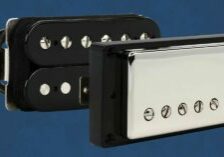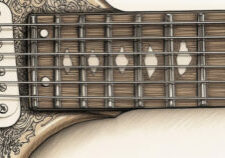Have you ever heard an annoying buzzing sound coming from your guitar? If so, you’re not alone. The buzzing of guitar strings is a common problem that many guitarists face. It’s an issue that can be frustrating and difficult to fix, but luckily, there are a few steps you can take to reduce the buzzing. In this article, we’ll look at the causes of guitar string buzzing and the steps you can take to reduce it. So, if you’re hearing a buzz coming from your strings, read on to find out why and what you can do about it.
Causes of Guitar String Buzzing
You’re likely experiencing a high-pitched hum when playing your instrument, and there are a few causes for this. Strings that are too low can cause buzzing, as the strings can be touching the frets or even hitting the pickup. This can be especially noticeable when playing chords, as the strings may not be properly aligned in the nut.
Another possible cause is string gauge. The thicker the strings, the more tension on the neck and the more likely you are to hear a buzzing sound when playing.
A third cause could be an issue with the neck itself. If the neck isn’t properly adjusted, the strings could be too close to the frets and cause buzzing.
Lastly, a worn nut can cause buzzing. The nut is the part of the guitar where the strings enter the neck, and if it’s worn, the strings can vibrate against it and cause a buzzing noise.
Fortunately, all of these causes can be fixed with the proper adjustments. By adjusting the string height, nut, and truss rod, you can reduce or eliminate the buzzing sound. Furthermore, replacing the strings and checking the guitar’s intonation can also help. With a few adjustments and some basic maintenance, you can get rid of the buzzing and enjoy your instrument for years to come.
Unstable Action and Poor Intonation
If your playing isn’t up to par, you’ll hear the dreaded buzz that can make your heart sink. Unstable action and poor intonation are two of the most common causes of this buzz. Unstable action is when the strings are too high or low from the fretboard and can cause buzzing when certain notes are played. Poor intonation is when the strings are not properly tuned to one another, which can also create a buzzing sound.
To prevent buzzing, it’s important to ensure that the action and intonation are set to the correct levels. A professional guitar technician can help with this. They can also adjust the truss rod, which controls the amount of tension on the strings and can help to eliminate buzzing. It’s also important to regularly check your guitar strings to make sure they are not too loose or too tight, as this can also cause buzzing.
Poor Setup of the Guitar
A poor setup of the instrument can lead to a lack of resonance and tonal clarity, causing your sound to suffer. This is often caused by incorrect string action, which is the distance between the strings and the fretboard. If the strings are too close to the fretboard, they can buzz against it when played.
This can be especially noticeable when playing higher notes on the higher strings. In addition, incorrect string height can also be a factor in buzzing strings. If the strings are too high, they can cause the notes to become sharp. This can lead to an unpleasant noise when combined with the buzzing of the strings. A good setup of the instrument can help prevent buzzing strings and ensure that your sound is clear and resonant.
Faulty Equipment and Old Strings
Faulty equipment and old strings can drastically reduce the clarity and resonance of your sound, so make sure to replace them regularly for the best performance. While strings that have been used for a long time may not sound bad, they can start to sound dull and lifeless, and can also be more prone to buzzing.
The same goes for guitars that haven’t been properly set up; this can cause all the strings to vibrate at different frequencies, which can lead to a buzzing sound. It’s important to get your guitar set up correctly and to replace old strings with new ones in order to get the best sound out of it.
Additionally, you should make sure to check your equipment regularly for any signs of wear and tear, as this can also lead to buzzing strings. Taking the time to regularly maintain your equipment and replace old strings can help you avoid the buzzing that often plagues guitarists.
Humidity and Temperature Changes
You must be mindful of humidity and temperature changes, as they can drastically affect the quality of your sound. When the air is dry and temperatures fluctuate, strings can become brittle and lose their tension, leading to buzzing. This is because wood and metal can expand and contract in response to changes in the environment. If you live in an area with extreme weather or where the climate is prone to sudden shifts, you need to take extra care of your guitar.
To help prevent buzzing, you can invest in a humidifier for your guitar and keep it in a case when not in use. This will help to maintain a more consistent environment and protect the strings from being affected by fluctuations in temperature and humidity. You should also regularly change your strings to ensure they remain in good condition. With proper care and maintenance, you can keep your guitar playing and sounding its best.
Frequently Asked Questions
How can I prevent my guitar strings from buzzing?
Playing guitar is a great way to express yourself musically, but it can be frustrating when your strings start buzzing. Fortunately, there are several things that you can do to help prevent your guitar strings from buzzing. First, make sure that your guitar is properly set up, as this can make a big difference in the sound of your guitar.
You can also check your bridge, tuning keys, and strings for any signs of wear and tear. If you find any, replace them as soon as possible. Additionally, make sure to keep your guitar clean, as dust or dirt can cause the strings to buzz. Lastly, try experimenting with different types of strings to find one that is best suited for your playing style. By following these tips, you should be able to reduce the amount of buzzing from your guitar strings.
What are the benefits of changing my guitar strings?
Changing guitar strings can have a range of benefits for guitar players. New strings provide a brighter, fuller sound, as well as a smoother playing experience. Additionally, changing strings regularly can help maintain the guitar’s intonation and tuning. Finally, changing guitar strings can help protect the instrument, as worn strings can weaken the tension of the neck and bridge, leading to structural damage.
How often should I change my guitar strings?
Changing your guitar strings should be done regularly to help maintain the playability and sound of your guitar. Generally, it is recommended that you change your strings every three months if you play often, and every six months if you play less frequently. If you notice that your strings are buzzing, this could be a sign of them needing to be changed sooner. It is also a good idea to keep spare strings so that you can change them quickly when needed.
What types of strings should I use for my guitar?
When it comes to choosing the right strings for your guitar, there are a few things to consider. It’s important to research the type of strings that work best with your particular guitar and the type of music you prefer to play. Acoustic guitars, for example, require lighter gauge strings than electric guitars. Nylon strings are great for classical and flamenco styles of guitar playing, while steel strings offer the best sound for rock and blues. It’s also important to consider the coating of the strings and whether or not they are wound. Coated strings last longer and are less likely to corrode, while the smoother sound of unwound strings is preferred by some guitarists.
What is the best way to adjust my guitar’s action?
Adjusting the action of your guitar is a common way to eliminate buzzing strings. Action is the distance between the strings and the fretboard, and is adjusted by turning the guitar’s truss rod. Generally, a higher action will reduce buzzing, but too high of an action can make the strings harder to press down. It’s important to adjust the action with care, as a truss rod that is adjusted too much can cause permanent damage to the guitar neck.
Conclusion
Guitar string buzzing is an annoying issue that can be caused by a variety of factors. Unstable action and poor intonation, poor setup of the guitar, faulty equipment and old strings, and humidity and temperature changes can all contribute to buzzing strings. In order to prevent buzzing strings, it’s important to ensure that the guitar is properly set up, the strings are replaced regularly, and the equipment is in good working order. Taking these steps will help to ensure that the guitar strings stay in tune and remain buzz-free.





